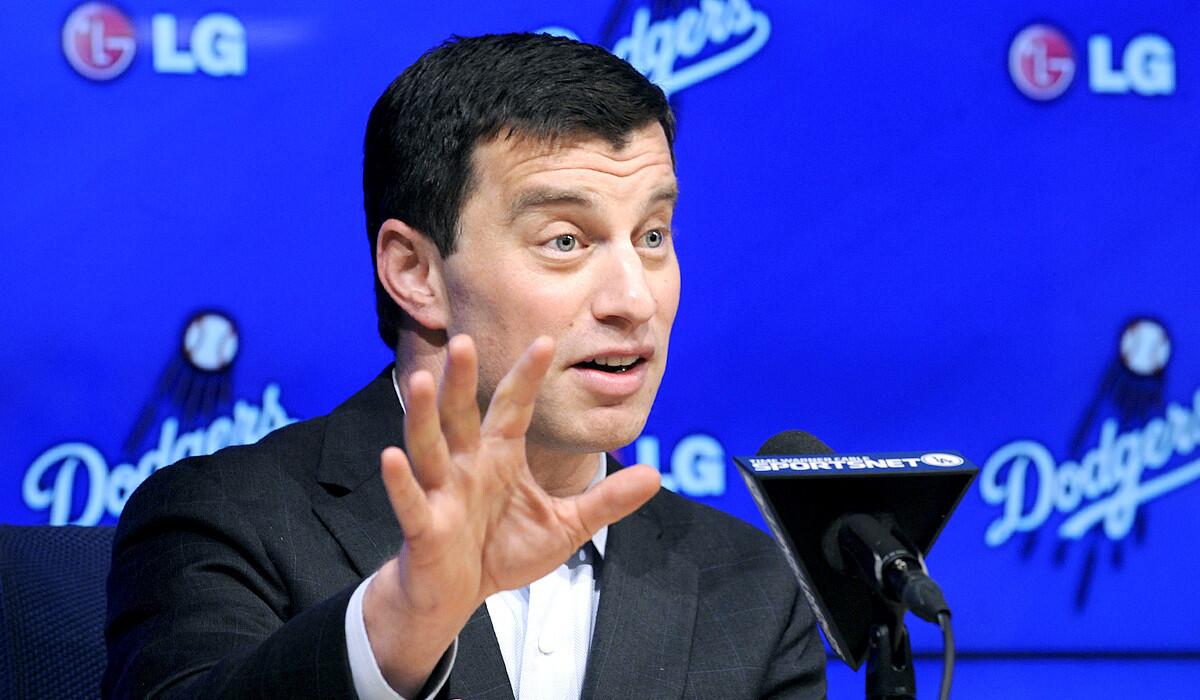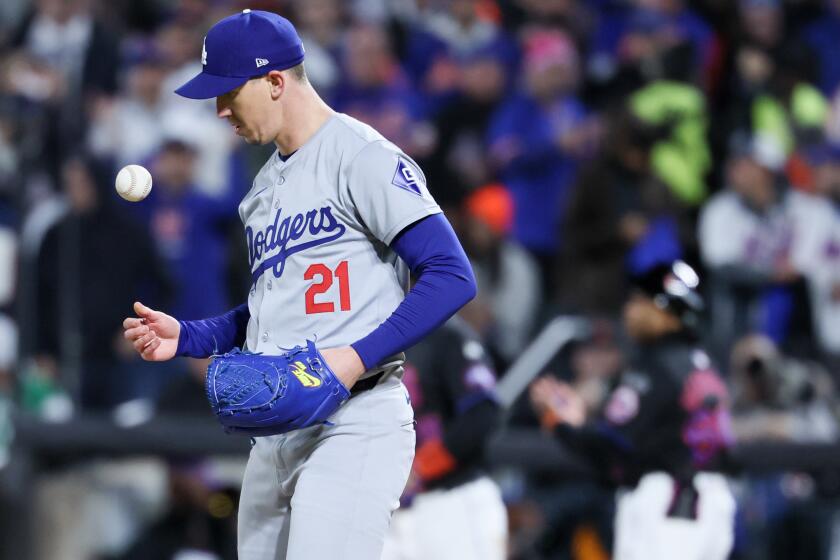In final analysis, stats have stature with Andrew Friedman’s Dodgers

The Dodgers have transformed their baseball operations department, turning what was considered a traditional front office into one that now looks like one of the most progressive in baseball.
If hiring Andrew Friedman to be their primary decision maker signified an increased commitment to statistical analysis, their moves over the last two days marked a full-on embrace.
Friedman is the leader of a group of young “Moneyball”-style executives, among them Farhan Zaidi, who was introduced Friday as general manager.
Zaidi, 37, was an assistant GM of the Oakland Athletics and spent the last decade working under Billy Beane.
Friedman’s other top lieutenant will be Senior Vice President Josh Byrnes, 44, who demonstrated fluency in sabermetrics as general manager of the Arizona Diamondbacks and San Diego Padres.
Incoming scouting director Billy Gasparino, 37, has a background in finance, like Friedman. Farm director Gabe Kapler, 39, is a former major league outfielder and television commentator who wrote in an online column last year that players should become acquainted with advanced metrics.
The group’s understanding of statistical analysis is believed to be far better than that of the previous regime headed by Ned Colletti.
“For us, information is king,” Friedman said.
Zaidi is aware that sabermetrics are viewed suspiciously in these parts because Paul DePodesta’s tenure as the Dodgers general manager was considered a failure. Zaidi made light of his reputation as a stathead, saying, “I brought my mini-screwdriver in case you want to leave your laptop with me after we’re done.”
In a more serious moment, he said, “At the end of the day, I know how we’re going to be judged is how the team performs on the field.”
Zaidi said he believes numbers tell only part of the story.
“Every mathematical model is a gross simplification of reality,” Zaidi said. “So every time you see a metric, you’re sort of asking yourself not only what it’s telling you but also what it’s missing, because there’s always something that’s missing.”
That’s why Zaidi said it was important to also use traditional methods of evaluating players.
“Our quest isn’t just evaluating how good players are, it’s how good players are going to be,” he said. “How are you going to identify guys that are going to break through? How are you going to identify guys that make a mechanical adjustment and turn into a completely different player? That’s why you need this sort of holistic approach in baseball operations, because otherwise you’re going to miss out on a whole swath of opportunities.”
Zaidi doesn’t view the use of statistical analysis as an either-or proposition.
“We need to be the best at everything,” he said. “I don’t think we’re in a position to make trade-offs of saying we’re a stat organization or a scouting organization.”
Zaidi said he expects decisions made by the Dodgers front office to be something of a democratic process. While Zaidi is outranked by Friedman, who is the president of baseball operations, he envisions a situation similar to that of the Athletics.
“In Oakland, I worked with a general manager who was regarded as this high authority figure and it was very collaborative there,” he said. “There was always a lot of discussion, a lot of debate, a lot of different perspectives. It’s not that you talk and the GM goes into another room and renders a decision.”
Zaidi said he expects he, Friedman and Byrnes to share the responsibility of communicating with other teams, as well as agents.
“We’ve all worked in different circles and have familiarity with different people in baseball,” Zaidi said. “I don’t think we’re going to have hard and fast rules about that. I think when one of us gets a call from another team, we’ll share that information and go from there.”
Short hops
Friedman announced that Manager Don Mattingly’s entire coaching staff would return next season: bench coach Tim Wallach, pitching coach Rick Honeycutt, hitting coach Mark McGwire, third-base coach Lorenzo Bundy, first-base coach Davey Lopes, assistant hitting coach John Valentin, assistant pitching coach Ken Howell and bullpen coach Chuck Crim. . . . Shortstop Hanley Ramirez has not accepted or rejected the one-year, $15.3-million qualifying offer he received from the Dodgers, Friedman said. Ramirez has until Monday to make a decision.
Twitter: @dylanohernandez
More to Read
Are you a true-blue fan?
Get our Dodgers Dugout newsletter for insights, news and much more.
You may occasionally receive promotional content from the Los Angeles Times.









